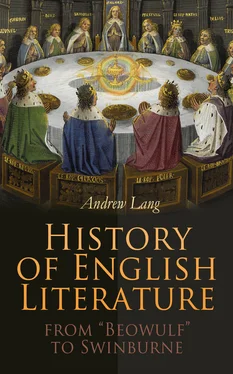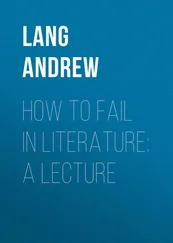1 ...7 8 9 11 12 13 ...40 The early entries in the "Chronicle" are very short: here is the history of the year 774.
"In this year a red Cross appeared in the heavens after sunset; and in this year the Mercians and Kentish men fought at Otford, and wondrous serpents were seen in the South Saxons' land."
This reads like a journal kept by a child. In later days events are recorded at more length, such as fights with the Danes; meetings of the Witanagemot , or great Council of the Wise; slayings of Kings and Earls; even foreign facts of interest about Popes and Emperors. But as late as 1066, the chronicler is brief enough, when he tells how William, Count of Normandy, sailed to Pevensey on Michaelmas Eve.
"This was then made known to King Harold, and he gathered a great army, and came to meet Count William at the hoar apple tree. And William came against him unawares, ere his people were in battle order. But the king, nevertheless, fought boldly against him with those men who would follow him, and there was a great slaughter made on each side. There were slain King Harold, and Earl Leofwine his brother, and Earl Gyrth his brother, and many good men; and the French held possession of the place of carnage, as to them God granted for the people's sins." We who write long books about a single battle, such as Waterloo, are surprised by the brevity of the "Chronicle".
Some seventy years later, just before it ends, the "Chronicle" has a long and famous passage about the cruel oppressions in Stephen's reign (1137). By that date the language has changed so much, that the meaning can easily be made out, even by readers who do not know Anglo-Saxon. The style of the "Chronicle" is always extremely simple, and the good monks are usually more interested in events affecting their own monasteries, than in matters which are of more importance to the history of the country. Nevertheless, there are records of periods in the "war-age" when the Danes were burning, plundering, and slaying through England, and there are characters of great interest among the kings, earls, and counsellors, lay or clerical, of whom we should know little or nothing if the monks had ceased to make their entries in the "Chronicle". To students of language, with its dialects and changes, the "Chronicle" is priceless, and a few poems and ballads are contained in its pages.
The most famous poem in the "Chronicle" is on the battle of Brunanburh (937), when the English, under Æthelstan, defeated the Scots and Danes. This song, translated by Tennyson, does not so much describe the fighting as the triumph after the battle.
Five lay
On that battle-stead,
Young kings
By swords laid to sleep:
So seven eke
Of Olaf's earls,
Of the country countless
Shipmen and Scots.
Olaf fled in his ship over the barren sea, the aged Constantine, King of the Scots, left his son dead on the field. As usual the raven, wolf, and eagle have their share of the corpses: an Anglo-Saxon poet could not omit these animals. This poet boasts that there has been no such victory since first the Anglo-Saxons "the Welsh overcame". Perhaps the enthusiasm of English students rather overrates the poetical merits of this war-song.
There is more poetry, and more originality in "Byrhtnoth," a song of a defeat at the hands of the Danes. The warrior entering the field of battle
Let from his hands his lief hawk fly,
His hawk to the holt, and to battle he stepped.
He haughtily refuses to accept peace in exchange for tribute which the Danes demand. The armies are divided from each other by a tidal river, and Byrhtnoth chivalrously allows the heathen to cross, at low tide, and meet him in fair field. There are descriptions of hand to hand single combats; and of the wounds given and taken, and the boasts of the slayers, who throw their spears, piercing iron mail, and shields of linden wood; and strip the slain of their armour and jewels. The friends of the fallen fight across the corpses. Byrhtnoth falls, some of his company flee, the rest make a ring of spears about the hero, one cries
The more the mood, as lessens our might,
that is,
The braver be we, as our strength fails.
The whole poem might be translated, almost without a change, into "the strong-winged music of Homer," or the verse of the old French "Song of Roland". The song is not conventional, it is a noble war-poem. For some reason the best war-poems are inspired by glorious defeats, at Maldon, at Flodden, at Bosworth, at Roncesvaux, at Culloden.
The "Anglo-Saxon Chronicle," running from Alfred's day to King Stephen's, and thus surviving the Norman Conquest, is the earliest historical writing in English prose. As we have seen, it was the work of the monks, regular soldiers of learning, living together under strict rules. On the other hand the secular clergy, parish priests and others, were the irregular levies against ignorance. The monks were fallen on evil times for learning and literature.
During the long cruel wars against the Danish raiders and settlers (900-960) many monasteries were overthrown; others, like Abingdon, became poor neglected places; into others the kings and nobles placed their younger children, to live comfortably on the rents and revenues of the Church, and neglect prayer and books. Under Eadwig the Fair, St. Dunstan (born 925) appeared as a reformer, making the rule of the Church respected, and being therefore at feud with Eadwig, as Thomas à Becket was with Henry II. Under Edgar (957-975), peace was restored, and Dunstan could carry out reforms as Archbishop of Canterbury. He brought back from Flanders the new rule-of the Order of St. Benedict (which the monk in Chaucer despises as not up to date) for the strict living of monks, and was backed by Bishops Oswald and Æthelwald, men of learning and reformers of education.
New monasteries, which often had schools attached to them, were built, and old monasteries were restored. Dunstan was an artist (a picture of him as a monk is still preserved, and is said to have been drawn by himself). He was skilled in music and metalworking, and fond of the old Anglo-Saxon poetry. He has left no books of his own writing, but there are curious early Lives of him in Latin. As a boy he climbed in his sleep to the roof of a church; he used to see visions of people at the time of their deaths; a large stone is said to have flown at him of its own accord; and, before his death, his bed, with him in it, was slowly raised up in air, and softly let down again. According to these tales, Dunstan must have been a "medium"; there is nothing saintly in such prodigies. Like many people of genius who were not saints, he was of a visionary nature, though a thoroughly practical and energetic man.
Thus he, with Oswald, Bishop of Worcester, later Archbishop of York; Abbo; Æthelwold; Byrthferth; and others, introduced "regulars"—Benedictine monks—in place of married priests into the cathedrals, and encouraged schools and learning of all kinds. Æthelwold himself taught Latin to boys at Winchester, and had the Latin book of the rules of the Benedictine monks done into Anglo-Saxon. A set of Anglo-Saxon sermons survives from this age called "The Blickling Homilies" (from Blickling, a house of Lord Lothian, where the manuscript has been preserved). Homilies are simple statements of Scriptural facts for simple hearers. The preacher already addresses the congregation as "my dearest brethren" ( mine gebrothra tha leofostan ). "Bethlehem," says the preacher, "means being interpreted, the House of Bread, and in it was Christ, the true bread, brought forth." "The Divine nature is not mingled with the human nature, nor is there any separation: we might explain this to you by a little comparison, if it were not too lowly; see an egg, the white is not mixed with the yolk, yet it is one egg." The sermons (these quoted are by Ælfric) are all plain teaching for plain people, but there is a famous address by Bishop Wulfstan, encouraging the English, by Biblical examples of Hebrew fighting patriots, to defend themselves against the cruel heathen Danes (1014).
Читать дальше












